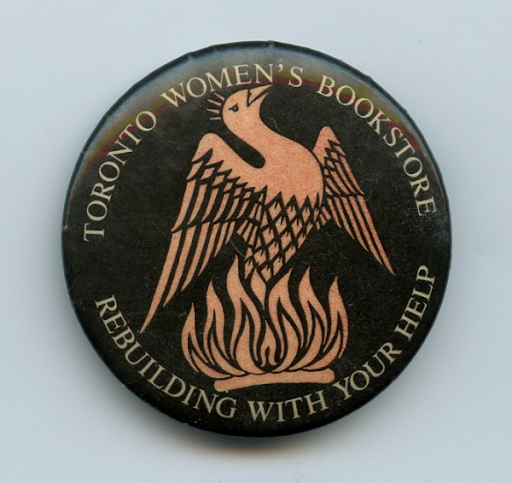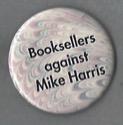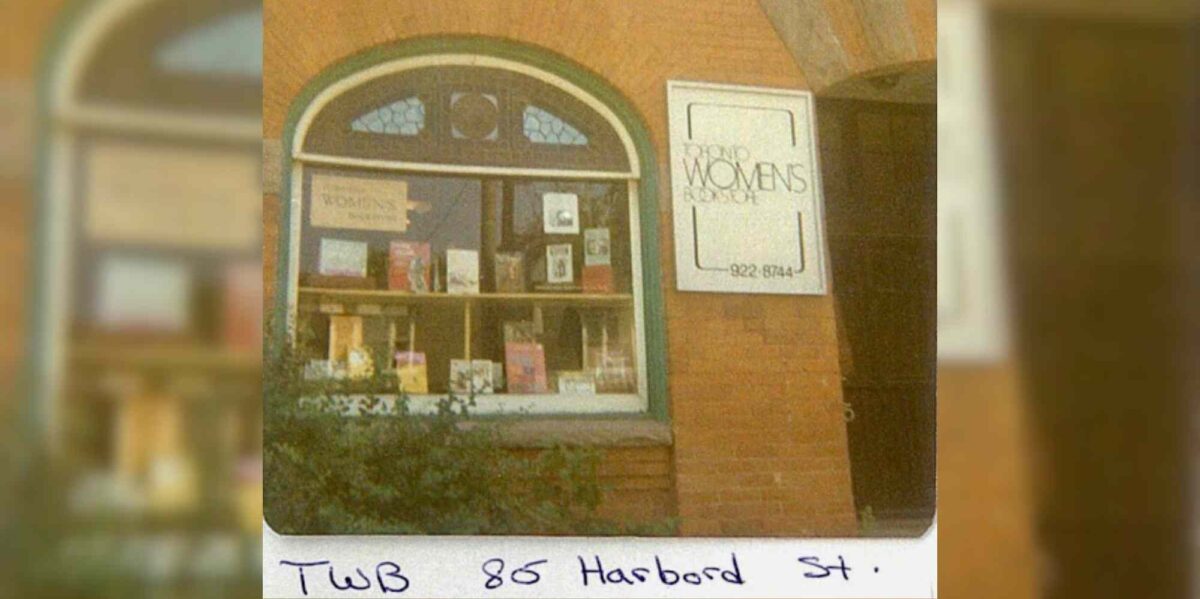The Toronto Women’s Bookstore (TWB) was always political.
It began in 1973 as some shelves at the Woman’s Place. The main location was on the first floor of 93 Harbord St. between Bathurst and Spadina.
By 1983, it had already become a beloved institution in Toronto’s feminist community. During this same period, the pro-choice struggle had become a central issue within feminist activism. Throughout, the bookstore supported the Morgentaler Clinic, which was located directly above the bookstore. Our customers were often hassled by anti-abortion zealots who demonstrated in front of the clinic, and in front of the bookstore. One evening, one of them tried to throw a firebomb into the clinic, missed and destroyed the Toronto Women’s Bookstore instead.
The tremendous support from the feminist movement for TWB was immediate and permitted us to move to our permanent home at 73 Harbord St., where it remained until 2012.

May Lui was a customer service and administration casual worker for a year, then became co-Manager with Anjula Gogia in 1997. This was a time of revitalization for TWB. 1998 was the 25th anniversary of the bookstore. We planned new programs and community connections to celebrate this new stage. In the fall of 1998 famed US author Alice Walker was on tour with her new book By the Light of My Father’s Smile and TWB organized the launch in Toronto. Tickets to the event were sold out, and the event itself was a huge success, the biggest event in TWB’s history.
We started a monthly book club open to everyone at low costs. We invited instructors to pitch four-week classes on different topics related to women, books, and social issues. Based on some of the content, and the preferences of the instructors, some courses were only open to women of colour. TWB had found that with limited spaces (10-12 spots per course) sometimes a course based on issues relating to women of colour became over-booked with white participants. Deciding to limit registration to 50 per cent or 100 per cent women of colour was new to our community. We frequently had to explain to customers why such spaces were important. All staff were trained to respond to such inquiries, so that it wasn’t only one of the women of colour managers that spoke to the issue. These conversations, in the late 1990s and early 2000s, sometimes resulted in a loss of customers. They were a small echo of tensions from over a decade before, when the first staff of colour at TWB had their own struggles within the predominantly white feminist bookselling and publishing communities of the time. Some issues included the lack of space given to women writers of colour. Relatedly, Huda Hassan, who will be hosting the 50th anniversary celebration of TWB, recently wrote an article for CBC about what happened when a now-prominent group of Black and women of colour writers, suggested they edit a women of colour issue of Fireweed in the early 1980s.
As much as possible, events were free. When ticket costs had to be added to offset expenses, there was a sliding scale, and nobody was turned away if they couldn’t pay. This principle was incorporated into how events were organized. All events not on-site were in accessible venues. While the TWB’s main floor was accessible, the basement and washrooms were not.
Even though we were a store, anyone who visited wasn’t required to spend money on books and other items. If you wanted to, you could come to TWB and peruse/read the books and magazines gently, check out the local feminist poetry zines, and see what free events were happening in Toronto via the posters and flyers, photocopied handbills and glossy postcards that different community groups dropped off.
In the pre-internet days, there was a literal hanging file folder in the front entryway for people looking for roommates, housing, shared rides to the then-popular Michigan Women’s Music Festival, items for sale. All of this was a part of free services offered to the community.
In the mid 1990s, while we did have email and internet, promotion remained old school. We paid graphic designers to produce gorgeous posters and promotion for different TWB events. But still, we went out into the streets of different downtown neighbourhoods to poster and distribute flyers.

Our button collection became quite famous. May was the button buyer for a time and hugely enjoyed looking through the newest button catalogues, finding funny and sometimes political buttons for customers to read, laugh about, and possibly buy.
The landscape of independent bookselling had changed a great deal by 2012. Both online book sales and large bookstore chains had taken over much of the Canadian bookselling space. Despite great efforts by the community, and the owner who took over the store in 2010, TWB had to close its doors in 2012.
People always say that TWB was more than just a bookstore, and it was. Toronto, and Canada, lost a vibrant, political, feminist, queer, and anti-racist community hub when TWB had to close its doors. Many of us still miss it, 11 years later.
This year, 2023, TWB would have turned 50 years old. We’re celebrating and commemorating this wonderful bookstore on Tuesday October 10, 2023, at 6:30 p.m. at Lula Lounge, 1585 Dundas St. W. in Toronto.
The event is free, all advanced tickets are sold out but there is a waiting list.
A full list of performers, writers, and speakers is viewable on the event listing on Facebook, which will also post updates regarding rush seats the night of the event. If you aren’t on Facebook and would like updates about the event, contact us at [email protected].
To livestream the event, click on this YouTube link on Tuesday October 10 at 6:30 p.m. ET.
The event will also be recorded, so if you aren’t able to be there in person or watch it live, the recording will be hosted on the Toronto Women’s Bookstore’s page on the Rise Up website.
……
May Lui is a consultant and educator. She is the former manager and events coordinator at Toronto Women’s Bookstore and continues to have many unread books in piles all over her home. Check out May’s website here.
Judy Rebick is a writer and activist who was a good friend of the Toronto Women’s Bookstore.



